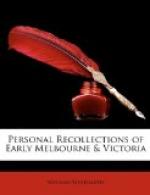“Allan K. Renny, of Dundee, Scotland, aged 24.” A remarkably fine young man, who died thus early, to the grief of all his friends. He was one of the staff of the Union Bank of Australia. Although the favourite of everyone, he retained his unaffected simplicity of manner and character to the last. He died of consumption, in the house of Mr. Cassell, who had invited him there when he took ill, in order that he might be better attended to. Cassell, James Gill, Alfred Ross, and myself took the last night of the dying lad in relays of three or four hours each; and when the last breath passed from the fine young face, Mrs. Cassell, who stood by with the rest of us, and who had nursed him with the fondest mother’s care, broke out into loud sobs of irrepressible grief. We decided upon a broken column as his monument—fit emblem of the life so early broken—and we settled his brief, simple epitaph, which Mr. Cassell drew up:—“Erected by his friends in this colony in testimony of esteem and regard.”
1848.
“Edmund Charles Hobson, M.D., born 1814, died in his 34th year.” The monument, erected by public subscription, commemorates also two sons and one daughter—all the family save one thus early carried off, for, alas! the father, although of large and well-filled mind, was a man of poor health and feeble physique. Mrs. Hobson, our old friend, still survives, but is at present in England. I have already alluded to the Doctor and his high qualities.
1850.
“James Jackson, of Toorak, who died at sea, aged 47.” This was Melbourne’s greatest merchant of his early time, although he died at so early an age. His house at Toorak, or rather the second house which he, with his enlarging fortune, built there, but which he did not live to enjoy, was long the finest of the place, and served for some years as the Governor’s residence. It supplies a striking illustration of the sudden needs of the advancing colony after its golden era. A prominent Melbourne trader had leased it at 300 pounds a year, but in the mid-term of the lease, a demand suddenly arising in 1854 for a Government House for Sir Charles Hotham, Toorak was sublet at 10,000 pounds a year. I recall the early, happy, Toorak home, where personal beauty in mother and young children lost its edge by being so common. The remaining family are now all in the old country. Mrs. Jackson still lives, the honoured head of a surrounding of descendants, which, to me at least, have been long past counting.
1850.
“Isabella, widow of James Williamson, solicitor, Edinburgh, aged 70.” This is the lady of whom I have already spoken, who gave up six fair daughters to the young settlement in its direst need, and who in turn have given to it multiplied sons and daughters.
1850.
“Edward Curr, aged 52. In your charity, pray for the soul of Edward Curr, of St. Heliers.”




